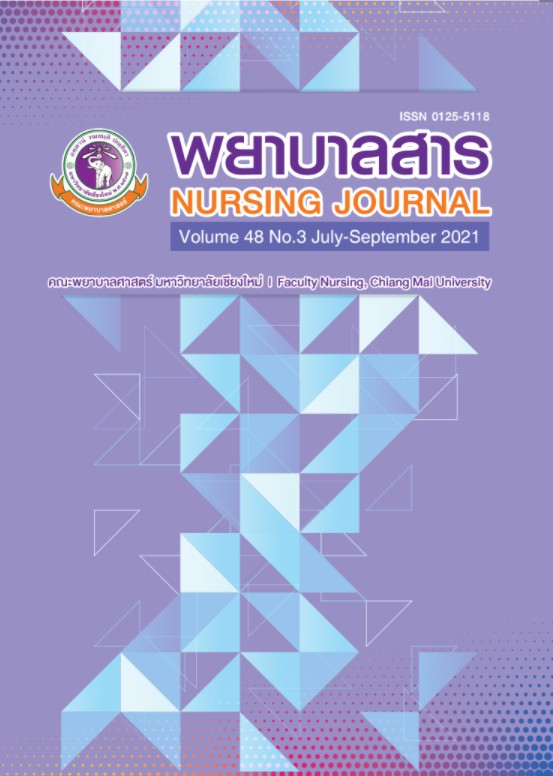Stress and Coping in Older Adults with Parkinson’s Disease
Keywords:
Stress, Coping, Older adults with Parkinson’s diseaseAbstract
Stress is a significant problem commonly found in older adults with chronic diseases that affects their health status and quality of life. This research aimed to describe stress and coping among older persons with Parkinson’s disease and the relationship between disease stages, stress and coping behaviour. The sample consisted of 100 older persons with Parkinson’s disease attending the Neurological Medicine Clinic at Chiang Mai Neurological Hospital from April to June 2017. The participants were purposively selected based on the inclusion criteria. Data were collected using the Perceived Stress Scale and the Jalowiec Coping Scale. All instruments had reliability coefficient .80. Data were analyzed using descriptive statistics, Spearman’s correlation and Pearson’s correlation coefficient.
The results showed that:
- Stress and coping both overall and sub-dimensional were at a moderate level.
- Stages of disease related positively at a high level with stress in older persons with Parkinson’s disease (r = .814, p < 0.01).
- Stress of older persons with Parkinson’s disease related positively at a moderate level with overall coping (r = .470, p < 0.01), emotional coping (r = .685, p < 0.01), and palliative coping (r = .530, p < 0.01) but did not have a significant relationship with confrontive coping.
The study results may be beneficial to health personnel in planning the intervention for managing stress and enhancing coping in the older persons with Parkinson’s disease.
References
Aree-Ue, S. (1997). Stress, Coping and quality of life in the elderly osteoarthritis patients(Master’s thesis, Master of Nursing Science). Graduate student, Faculty of Nursing,Mahidol University, Thailand. (in Thai)
Arnold, E., & Boggs, K. U. (1999). Communicating with clients in stressful situation. In E. Arnold, & K. U. Boggs (Eds.), Interpersonal relationship: Professional communicating skill for nurse. (pp.445-475). Philadelphia: W.B. Saunders.
Bhidayasiri, R., Phanthamchinda, K., Bunnag, S. (2007). Treatable Parkinson’s Disease. Bangkok: Center for Treatment of Parkinson’s Disease and Abnormal Movement Disorders, King Chulalongkorn Memorial Hospital, Thai Red Cross Council. (in Thai)
Bhidayasiri, R., Wannachai, N., Limpabandhu, S., Choeytim. S., Suchonwanich, Y., Tananyakul, S. (2011). A National registry to determine the distribution and prevalence of Parkinson’ disease in Thailand: Implications of urbanization and pesticides as risk factor for Parkinson’s disease. Neuroepidemology, 37, 222-230. doi:10.1159/000334440
Cohen, S., Kamarck, T., & Mermelstein, R. (1983). A global measure of perceived stress. Journal of Health and Social Behavior, 385-396. Retrieved from http://www.jstor.org/
Curtis, R., Groarke, A., Coughlan, R., & Gsel, A. (2004). The influence of disease severity, perceived stress, social support and coping in patients with chronic illness: A 1 year follow up. Psychology, Health & Medicine, 9(4), 456-475. doi: 10.1080/1354850042000267058
Degazon, C. E., & Parker, V. G. (2007). Coping and psychosocial adaptation to Type 2 diabetes in older blacks born in the Southern US and the Caribbean. Research in Nursing & Health, 30(2), 151-163. doi: 10.1002/nur.20192
de Souza-Talarico, J. N., Chaves, E. C., Nitrini, R., & Caramelli, P. (2009). Stress and coping in older people with Alzheimer’s disease. Journal of Clinical Nursing, 18(3), 457-465.doi: 10.1111/j.1365-2702.2008.02508.x
Djamshidian, A., & Lees, A. J. (2013). Can stress trigger Parkinson's disease? Journal of Neurology, Neurosurgery & Psychiatry. doi:10.1136/jnnp-2013-305911
Downe-Wamboldt, B. L., & Melanson, P. M. (1998). A causal model of coping and well-being in elderly people with arthritis. Journal of Advanced Nursing, 27(6), 1109-1116. doi: 10.1046/j. 1365-2648.1998.00621.x
Dunkel-Schetter, C., Feinstein, L. G., Taylor, S. E., & Falke, R. L. (1992). Patterns of coping with cancer. Health Psychology, 11(2), 79-87.
Hirsch, L., Jette, N., Frolkis, A., Steeves, T., & Pringsheim, T. (2016). The Incidence of Parkinson's disease: A systematic review and meta-analysis.Neuroepidemiology, 46(4), 292-300. doi: 10.1159/000445751
Hemmerle, A. M., Herman, J. P., & Seroogy, K. B. (2012). Stress, depression and Parkinson's disease. Experimental Neurology, 233(1), 79-86. doi:10.1016/j.expneurol.2011.09.035
Hoehn, M. M., & Yahr, M. D. (1967). Parkinsonism: Onset, progression, and mortality. Neurology, 17(5), 427-442.
Jalowiec, A. (1988). Confirmatory factor analysis of the Jalowiec Coping Scale. In C. F. Waltz & O. L. Strickland (Eds.), Measurement of nursing outcomes:Measurement client outcome. 1, 287-308. New York: Springer.
Jankovic, J., & Tolosa, E. (2015). Parkinson’s disease & moment disorder (6th ed.). Philadelphia: Wolters Kluwer.
Lazarus, R. S., & Folkman, S. (1984). Stress, appraisal, and coping. New York: Springer.
Macht, M., Brandstetter, S., & Ellgring, H. (2007). Stress affects hedonic responses but not reaching-grasping in Parkinson's disease. Behavioural Brain Research, 177(1), 171-174. doi: 10.1016/j. bbr.2006.10.032
Mingkwan, P. (1999). Stress and coping in the elderly stroke patients (Master’s thesis, Masterof Nursing Science). Graduate student, Faculty of Nursing, Chiang Mai University,Thailand. (in Thai)
Mossakowski, K. N., & Zhang, W. (2014). Does social support buffer the stress of discrimination and reduce psychological distress among Asian Americans? Social Psychology Quarterly, 77(3), 273-295. doi: 10.1177/0190272514534271
Opasrattanakorn, S., Detprapon, M., Sumdaengrit, B. (2015). Stress and coping of nasopharyngeal carcinoma patients receiving concurrent chemoradiotherapy treatment. Ramathibodi Nursing Journal, 21(2), 158-171. (in Thai)
Pachana, N. A., Egan, S. J., Laidlaw, K., Dissanayaka, N., Byrne, G. J., Brockman, S., ... & Starkstein, S. (2013). Clinical issues in the treatment of anxiety and depression in older adults with Parkinson's disease. Movement Disorders, 28(14), 1930-1934.
Polit, D. F.& Beck, C. T. (2004). Nursing research: Principle and methods (7thed.). Philadelphia:Lippincott Williams & Wilkins.
Pringsheim, T., Jette, N., Frolkis, A., & Steeves, T. D. (2014). The prevalence of Parkinson's disease: A systematic review and meta-analysis. Movement Disorders, 29(13), 1583-1590.doi: 10.1002 / mds.25945
Sanders-Dewey, N. E., Mullins, L. L., & Chaney, J. M. (2001). Coping style, perceived uncertainty in illness, and distress in individuals with Parkinson's disease and their caregivers. Rehabilitation Psychology, 46(4), 363. doi: 10.1037//0090-5550.46.4.363
Utama, N., Chintanawat, R., Ausayakhun, S., Nanasilp, P. (2015). Visual Impairment, coping strategies, and vision-related quality of life among elders with cataract. Nursing Journal,42(3), 61-71. (in Thai)
Yodkaew, P. (2010). The relationship between stress and coping methods of diabetic patients with cataract complications before operation. Thammasat Thai Journal of Ophthalmology, 5(1), 49-58. (in Thai)
Downloads
Published
How to Cite
Issue
Section
License
บทความที่ได้รับการตีพิมพ์เป็นลิขสิทธิ์ของวารสารพยาบาลสาร
ข้อความที่ปรากฏในบทความแต่ละเรื่องในวารสารวิชาการเล่มนี้เป็นความคิดเห็นส่วนตัวของผู้เขียนแต่ละท่านไม่เกี่ยวข้องกับมหาวิทยาลัยเชียงใหม่ และคณาจารย์ท่านอื่นๆในมหาวิทยาลัยฯ แต่อย่างใด ความรับผิดชอบองค์ประกอบทั้งหมดของบทความแต่ละเรื่องเป็นของผู้เขียนแต่ละท่าน หากมีความผิดพลาดใด ๆ ผู้เขียนแต่ละท่านจะรับผิดชอบบทความของตนเองแต่ผู้เดียว






